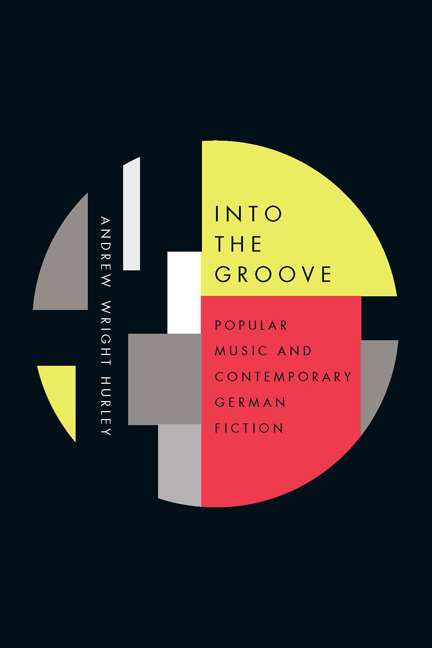Book contents
- Frontmatter
- Dedication
- Contents
- Acknowledgments
- Introduction
- 1 Preludes and Returns: Popular Music, the ʿ68 Generation, and the Literarization of the Jukebox
- 2 Enter the Double Agent: The German Popular Musician as Novelist
- 3 Techno-Lit: Electronica and Its Impacts on Fiction
- 4 Analogue is Better: Rock- and Pop-centric Literature
- 5 After the GDR's “Musical Niche Society”? Popular Music in the Literature of Thomas Brussig
- 6 The Gendering of Popular Music in the Novels of Karen Duve and Kerstin Grether
- Conclusion: Out of the Groove?
- Bibliography
- Index
Introduction
Published online by Cambridge University Press: 05 May 2015
- Frontmatter
- Dedication
- Contents
- Acknowledgments
- Introduction
- 1 Preludes and Returns: Popular Music, the ʿ68 Generation, and the Literarization of the Jukebox
- 2 Enter the Double Agent: The German Popular Musician as Novelist
- 3 Techno-Lit: Electronica and Its Impacts on Fiction
- 4 Analogue is Better: Rock- and Pop-centric Literature
- 5 After the GDR's “Musical Niche Society”? Popular Music in the Literature of Thomas Brussig
- 6 The Gendering of Popular Music in the Novels of Karen Duve and Kerstin Grether
- Conclusion: Out of the Groove?
- Bibliography
- Index
Summary
In late 1989, just as what Peter Handke called Europe's “Jahr der Geschichte” (year of history) was coming to a close, the forty-sevenyear-old author set about writing a curious short story-cum-essay titled Versuch über die Jukebox (translated as The Jukebox, 1990), which reflected on the protagonist's musical socialization, and in particular his relationship to the jukebox. In the context of the changes underfoot in Europe, the protagonist felt that he had to justify writing about something so seemingly frivolous. The next few years would be significant ones for the German literary scene, as it struggled to come to terms with the effects of that “year of history.” A series of literary debates about such things as East German writers’ involvement with the secret police, and about the idea of a moralistic literature, destabilized the position of many of the established writers on both sides of the former inner-German border. Like other German markets the literary market was also subjected to economic rationalization. In this context, various interested parties put forth their views on the direction that German literary writing should now take. Soon, what had seemed to Handke to need defending against charges of being frivolous would become far more common.
For example, one of the important voices in the discourse about the renewal of German literature was Matthias Politycki. In October 1995, he boldly declared that “Literatur muss sein wie die Rockmusik” (literature must be like rock music). Two years later, he published Weiberroman (A Novel of Women), a work that was redolent with references to popular music. Although they may not have agreed exactly with Politycki's musical tastes, or with his literary approach, in the years to come various younger German writers—many grouped under the problematic rubric Popliteraten (pop writers)—thematized popular music or otherwise borrowed from it in ways and to an extent that was significant.
The year 1998 marked an early high point in this development. That year, Suhrkamp published “pop” novels by three writers—Rainald Goetz's Rave, Thomas Meinecke's Tomboy, and Andreas Neumeister's Gut Laut (Real Loud).
- Type
- Chapter
- Information
- Into the Groove?Popular Music and Contemporary German Fiction, pp. 1 - 20Publisher: Boydell & BrewerPrint publication year: 2015



